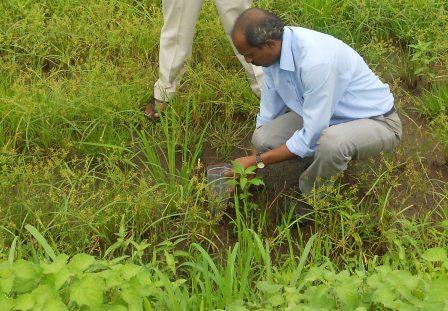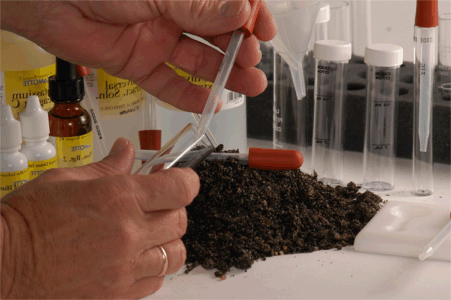Soil Testing and Analysis is a process in which nutrients, elements, contaminants, pH and acidity is checked by sampling and testing in laboratory for Agricultural or Construction purpose.
Soil Pollution
The soil pollution or soil contamination is defined as the presence of materials in the soil which are harmful to the living beings when they cross their threshold concentration levels. It is cause by Industrial activity, Agricultural Chemicals, Fertilizers (Excess use) or improper disposal of waste.
Read here why and how soil fertility is checked?
What Causes Soil Pollution?
Industrial wastes such as harmful gases and chemicals, agricultural pesticides, fertilizers and insecticides are the most common causes of soil pollution or soil contamination. Improper septic system and management and maintenance of the same. Leakages from sanitary sewage. Acid rains, when fumes released from industries get mixed with rains. Fuel leakages from automobiles, that get washed away due to rain and seep into the nearby soil. Unhealthy waste management techniques, which are characterized by release of sewage into the large dumping grounds and nearby streams or rivers.
What are the Effects of Soil Pollution?
Decrease in soil fertility and therefore decrease in the soil yield. How can one expect contaminated soil to produce healthy crops? Loss of soil and natural nutrients present in it. Plants also would not thrive in such soil, which would further result in soil erosion. Foul smell due to industrial chemicals and gases might result in headaches, fatigue, nausea, etc., in many people. Creation of toxic dust is another potential effect of soil pollution.
Soil Sample Collection

Soil sample collection is the most important & critical step in soil analysis. There are two ways of collecting soil samples. Collection of soil sample is depending on size of field and uniformity.
1. Grab Sampling
In this method, Soil sample is collected randomly from field. This method is suitable for the fields which are small in size and uniform. This is a most common & economic method used in soil analysis.
2. Composite sampling
In this method more than one sub samples mixed for sampling field. Generally, this type of method is suitable for larger & non-uniform fields. In this sampling method preferebally 15 to 25 sub samples are collected for best result. Also deeper samples may be collected for subsoil analysis. After soil sampling collection sample is placed in clean plastic bucket & mixed completely. After that desired sample amount is removed from that bucket & let it dry for 2-3 days. After that it is sent to laboratory for the further Soil testing.
Soil Testing in Laboratory
Soil testing is carried out in our analytical laboratory for following parameters:
- pH
- Residual Chlorine
- Chloride as Cl-
- Sulphate as SO4
- Phosphate as PO4
- LOD @ 105 degree C
- LOI @ 550 degree C
- Flash Point
- Calorific Value
- Specific Gravity
- Arsenc as As
- Cadmium as Cd
- Cobalt as Co
- Copper as Cu
- Chromium as Cr
- Lead as Pb
- Mercury as Hg
- Nickel as Ni
- Zinc as Zn
- Organic Matter

Soil Testing Methods Used in Laboratory
There are many types of analytical Soil testing methods. We follow Water, Mehlich buffer, Mehlich 3 (ICP), Summation, Loss on Ignition, Combustion, Specific Ion Electrode, Electrical Conductivity (1:2), EPA Method 3050B/3051 + 6010, Hydrometer Method, EPA Method 7473, ASTM Method C 25 etc. methods.
Soil Sediment Sampling
In this method we collect samples of soils from rivers, streams, marine etc. water sources. This type of sampling can be done for chemical, physical, toxicological and biological analysis. We offer three types of sampling in soil sediment i.e.
- Grab Sampling
- Dredge sampling
- Core sampling
For more information you can see Our Soil sediment sampling process guide.
Importance of Soil Analysis in Laboratory
Soil analysis can determine required inputs for efficient & economic production. It gives ideas to determine how to use fertilizers. Also important to identify causes of nutrients related plant growth problems.
Soil Testing for Agriculture
A Soil sample can be taken from farm and analysed in laboratory for its composition, nutrients levels, minerals, physical and chemical characteristics.
Regular soil testing can help us to determine its current fertility levels, in case of any nutrients deficiencies, toxicity and harmful-useful minerals. It can also help us to give early warnings of land degradation. Soil analysis helps us to identify types of fertilizers and develop nutrient management plan that are required to improve the yield.
Soil testing in Construction
Soil testing in construction projects plays very important role. It helps us to detect the type of plinth (foundation) is needed for maximum safety of the project. If we know things like moisture content, minerals, density of the soil, permeability and bearing capacity of the soil, then it gives an understanding of next steps needed for considerations for foundations.
Types of Soil tests used in Construction:
- Moisture content test – To detect humidity of the soil and plan foundations accordingly
- Specific gravity test – To understand presence of organic matter, heavy metals etc.
- Dry density test- It helps to decide how strong foundation should be.
- Atterberg Limits Test
- Compaction Test
Why Soil Testing Laboratory for Agriculture and Construction
We have highly experienced & qualified staff for collecting,Soil Testing, Analyzing & Reporting of soil samples for Agriculture and Construction purpose in Mumbai, Thane, Navi Mumbai, Palghar, Panvel cities. We also provide Services for Soil Fertility testing, Soil Investigation and Reason for soil contamination in Soil Analysis Services.
If you have any queries or doubts please let us know. we would like to hear from you.
Frequently Asked Questions:
You can call Perfect Pollucon Services on 9967436537. Our team will get in touch with you and explain the next steps.
Soil testing for agriculture commonly refers to the analysis of a soil sample to measure nutrient content, composition, and other characteristics such as acidity or pH level. As soil nutrients vary with depth and soil components change with time, the depth and timing of a sample may also affect results.

Hi, I want to do soil testing for farming. Land is in Murbad Taluka. I am interested in farming and I am desirous to plant some trees in the land. Please suggest me which soil testing is necessary and its charges. My Mobile No. 996721033
Hi Hemant,
Request you to get in touch with us on +91-9967436537 for quick support.
Thank you.
I want to test the soil of my small farmhouse land near badlapur.
I want to check the fertility of land for agriculture.
I want to know the procedure and charges for this test.
Thank you.
Hi Rahul,
You can contact us on 9967436537 for more information.
Thank you.
Hi,
I am looking for soil testing lab for construction purpose. We have already collected samples from 3 bores in our plot. Samples are currently in Bhandup east
Please let us know
Regards and take care
Rajendra Sawant
Mob.
Dear Rajendra,
Request you to call us on 9930180059 / 9967436537 for quick response.
Thank you,
PPS Team
It really helped when you elaborated on how soil testing and analyzing it’s key for several industries. The other day, I heard my uncle talking about wanting to start growing some veggies on his land and selling them. After reading your article, I believe it’d be wise if my uncle gets his land’s soil tested before using it for agriculture purposes, so I’ll suggest it when I see him. Thanks for the information on how soil testing helps you know how fertile your land could be.
Hey Eli,
Glad you found it useful. 🙂 Thanks
I was captivated when you mentioned that oil testing in construction ensures the safety of the project. My friend told me that their project needs soil testing. I should advise him to go for it to ensure their safety.